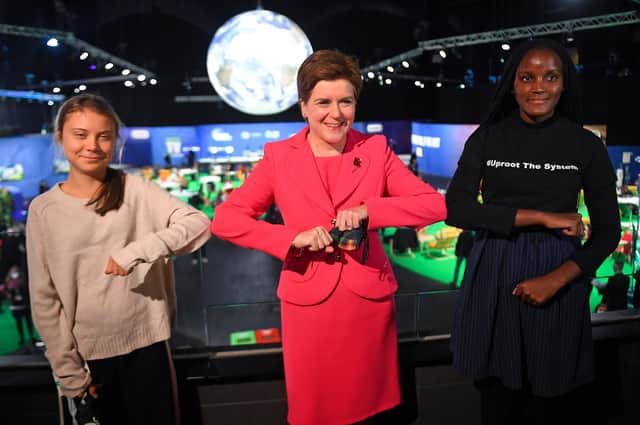Climate change: Scotland must get its faltering drive towards net zero emissions back on track for the sake of the planet and the economy – Lang Banks, WWF


Furthermore, it stated that ambitious and urgent steps are required to transform how we heat our homes, reform our transport system and reduce farming emissions. The time for talking is over. Target-setting and strategy-making alone will not reduce emissions.
The timing of the CCC report is particularly salient given that the Scottish Government will be announcing its budget later this week. The Deputy First Minister John Swinney will set out his spending plans for the year ahead as the country faces a ‘Winter of Discontent’ in all but name. We all know these are challenging times for public finances and households alike.
Advertisement
Hide AdAdvertisement
Hide AdBut the causes of and solutions to the cost-of-living and climate crises have never been more connected – we must wean ourselves off polluting, volatile fossil fuels, which are pushing our households, our economies and our environment to the brink. That’s why it’s important that money is spent on the right things, ensuring that we get the most out of public finances and build an economy and country that’s fair for us all and fit for the future.
A cornerstone of Scotland’s prosperity is our climate targets, which are the foundations for creating thriving new low-carbon industries and green jobs. Alongside these ambitious legal targets, we need a bold budget that backs up these aspirations, ensuring that both national and local government can drive down emissions year on year, just as the Scottish Government has committed to do. Expenditure on delivering our climate measures must be maintained, and in some areas increased.
There’s no doubting that this is going to be tough as, for most of us, when we turn on our heating system at home, it means burning expensive fossil fuels. Typically, this is gas but in some homes it’s through heating oil, or even coal. This is a major issue as heating accounts for almost a quarter of the nation’s emissions. It is therefore vital that we switch to heating systems that keep our homes warm and cosy, without also heating the planet.
Thankfully the technology to achieve this already exists in the form of heat pumps. In simple terms, these are refrigerators in reverse, taking in cold air and pumping out warm, offering a low-carbon alternative which can be used in most homes. Importantly, heat pumps run on electricity and, in Scotland, renewables generate the equivalent of almost 100 per cent of our electricity use.
But changing heating systems can be a costly affair upfront, and so we’re calling for the government to make it a priority to set out how it will increase investment as well as support households to make the switch. A budget that delivers on this, is a budget of green growth. Research shows that for every £1 of public spending on energy efficiency, it creates £5 in the local economy. This is prosperity that will reach all corners of Scotland as we upgrade houses across the nation, from Lockerbie to Lerwick.
All spending announced this week needs to help us tackle the climate and nature emergencies. That doesn’t always mean increasing budgets, it means spending the money we have more wisely. For example, we currently spend over half a billion pounds supporting farmers every year to help them produce food and maintain landscapes. But with nature in severe decline and the need to rapidly reduce our agricultural greenhouse gases, our farm support system needs to transform into one that is fit for the 21st century, incentivising farmers to reduce emissions, and restore nature.
Doing this will move us towards nature-friendly practices that will provide food that is both accessible and affordable, enhance the resilience of our food system and ensure we’re better shielded from price shocks, like those currently caused by the war in Ukraine which is leading to high fertiliser costs for farmers.
Earlier this year the Scottish Government announced a laudable vision for Scotland to become a global leader in sustainable and regenerative agriculture. However, whilst the Scottish Government talks a great talk, our neighbouring countries are laying out detailed tangible plans and budgets that will lead their farming to a net-zero future. The lack of direction here is causing farmers and financial institutions to hold back from much-needed investment for the green transition.
Advertisement
Hide AdAdvertisement
Hide AdWe also need to see significant funding for the major changes needed in our transport system. Roads are currently our largest sources of carbon emissions and a major budget draw, creating hazardous pollution hot spots in major cities. Improving public transport and investing in active travel would lead to cleaner air and healthier, happier lives as well as having the much-needed benefit of reducing the burden on the NHS with fewer respiratory diseases.
It’s now time to have a laser focus on helping all of us in Scotland cut our emissions as fast as possible, bringing environmental, social and economic benefits to all. Investment in climate action and nature recovery delivers benefits that protect the planet whilst also working for the economy. Scotland is already powering ahead in its renewable industries and could export these technologies across the world. We know that investing in peatland restoration, or restoring our native woodlands, can create important green jobs in fragile rural economies, and that improving energy efficiency in our homes will create jobs across each part of the country, whilst protecting family incomes and our health. A win-win for us and the planet.
Lang Banks is director of WWF Scotland
Comments
Want to join the conversation? Please or to comment on this article.